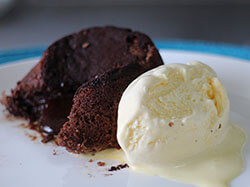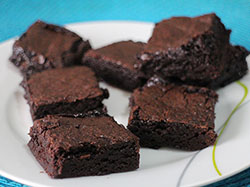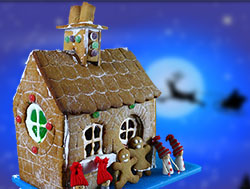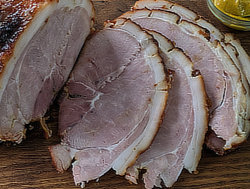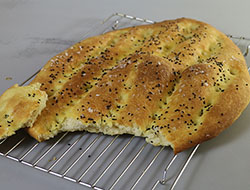
Opera Cake
Introduction & method
Opera Cake was apparently invented at a cake shop in Paris in the mid-50s. It's made of layers of sponge cake, buttercream and chocolate ganaches, finished with a mirror-finish chocolate glaze. It's best to take your time when attempting this recipe - I took three days over it, but I was also filming it for a video. Anyway, have a go - if you don't mess it up, it's a seriously impressive thing!
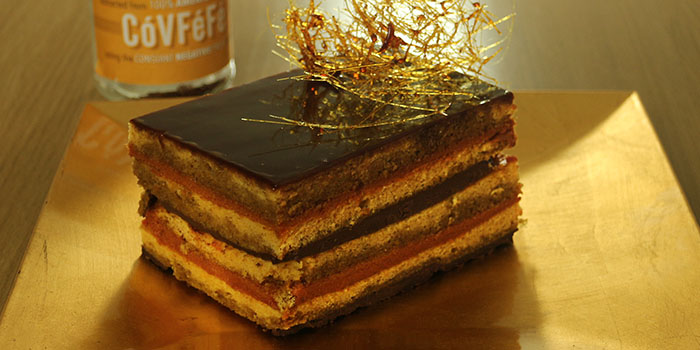
Make the sponge cake
Preheat your oven to 200°C (392°F) for a convection oven, 220°C (425°F) conventional. You'll need some kind of baking sheet - the one I used was 34cm x 23cm (13½ inches x 9 inches). Dab some butter in the corners (to stick down the paper with), then line it with a sheet of greaseproof paper, leaving some overhanging. Generously butter the paper, then dust it with flour.
Beat the whole eggs in a large bowl with an electric mixer. You want the eggs to triple in volume and form a ribbon when you remove the mixer - this should take 2 to 3 minutes. Add the ground almond and caster sugar and mix until combined. Sift the flour over the batter and gently fold it in.
Clean off your mixer's beaters, then whisk the egg whites in a separate bowl until they are foamy. Add the cream of tartar and salt and beat until you get soft peaks. Add the granulated sugar, and beat until you reach stiff peaks.
Fold the egg whites into the almond mixture, in stages. Fold in the melted butter, and then pour the batter evenly onto the prepared baking sheet. Carefully spread it into a layer about 5mm (quarter of an inch) thick. Be careful not to knock the air out of it.
Bake it until it is pale golden and feels a bit springy when you poke it. This should take 8-10 minutes. Let it cool in the tin for 10 minutes, then carefully place it face down on a cutting board. Peel off the greaseproof paper, and cut the cake into squares or rectangles of the desired size.
Make the coffee syrup
Dissolve the coffee granules in 1 tbsp of boiling water. Dissolve the sugar and remaining water in a heavy saucepan. Let the syrup simmer gently for 5 minutes. Take it off the heat and stir in the coffee mixture.
Make the coffee buttercream
Your butter needs to be soft - if it is too cold, place it near a radiator for a while until it becomes easy to work with. Beat the butter until it is smooth, then beat in the sugar until the mixture is smooth and creamy. Dissolve the coffee granules in 1 tbsp of boiling water and add it to the mix along with the cream. Mix until it's all incorporated, and set aside.
Make the Chocolate Ganache
In a small saucepan on medium heat, bring the cream almost to the boil. In a bowl, break up the chocolate into small chunks. Pour the hot cream over the chocolate, and stir continuously until all the chocolate has melted.
Make the Chocolate Glaze
Put water, sugar and cream in a small saucepan. Heat them up until the sugar is melted. Remove from heat and sprinkle the gelatine onto the hot mixture. Stir well until it is all dissolved, then sift in the coca powder and stir until dissolved. Allow to cool.
Tip
You can do all of the above steps ahead of time.
Assemble the Cake
Paint the coffe syrup onto the sponge cake and let it soak in. The size of cake you make is entirely up to you, but you need to have four layers of cake, so you'll need to divide up your cake appropriately. Make sure your buttercream and chocoalte ganache are at room temperature and can spread easily. Use a spatula to spread the buttercream in an even layer on two of the pieces of cake. Make sure you spread it right to the edges. Spread the ganache on a third piece of cake. Place this piece on top of one of the buttercream-coated pieces, then stck the remaining buttercreamed piece and finally the uncoated piece on top. Put the whole stack on a plate and gently press it all down. Put it in the fridge to firm up.
When the block of cake is nice and firm, you can glaze it. Your glaze needs to be at 32°C (90°F). If it is cooler than that, set a steel bowl over a pan of simmering water, add the glaze and heat it until it reaches the correct temperature. Turn your cake stack upside down - this will give you a perfectly flat surface where the cake was resting on the plate. Carefully pour the glaze onto the cake. Try not to let any spill over the edges. Place in the fridge to set.
When the glaze is set, carefully trim the edges of the cake to reveal the layers. If you like, you can decorate the cake with some piped chocolate. A motif of musical notes is common, as is writing the word 'Opera'.
Ingredients & Info
ALMOND CAKE
 3 egg whites
3 egg whites 1 tbsp sugar
1 tbsp sugar 100 grams ground almonds
100 grams ground almonds 100 grams caster (powdered) sugar
100 grams caster (powdered) sugar 3 whole eggs
3 whole eggs 50 grams plain white (all-purpose) flour
50 grams plain white (all-purpose) flour 2 tbsp unsalted butter
2 tbsp unsalted butterCOFFEE SYRUP
 1 tsp instant coffee granules
1 tsp instant coffee granules 100 ml water
100 ml water 100 ml granulated sugar
100 ml granulated sugarCHOCOLATE GANACHE
 100 grams dark chocolate (min 70% cocoa)
100 grams dark chocolate (min 70% cocoa) 100 ml double (heavy) cream
100 ml double (heavy) creamCOFFEE BUTTERCREAM
 100 grams softened butter
100 grams softened butter 200 grams caster (powdered) sugar
200 grams caster (powdered) sugar 1 tbsp double (heavy) cream
1 tbsp double (heavy) cream 1 tbsp coffee granules
1 tbsp coffee granulesMIRROR-FINISH CHOCOLATE GLAZE
 4 tbsp water
4 tbsp water 4 tbsp double (heavy) cream
4 tbsp double (heavy) cream 75 grams caster (powdered) sugar
75 grams caster (powdered) sugar 1 tsp powdered gelatine
1 tsp powdered gelatine 1½ tbsp cocoa powder
1½ tbsp cocoa powderPrep time: 1 hour.
Setting time: 2 hours.
Cooking time: 10 mins.
Total time: 3 hours 10 minutes.
